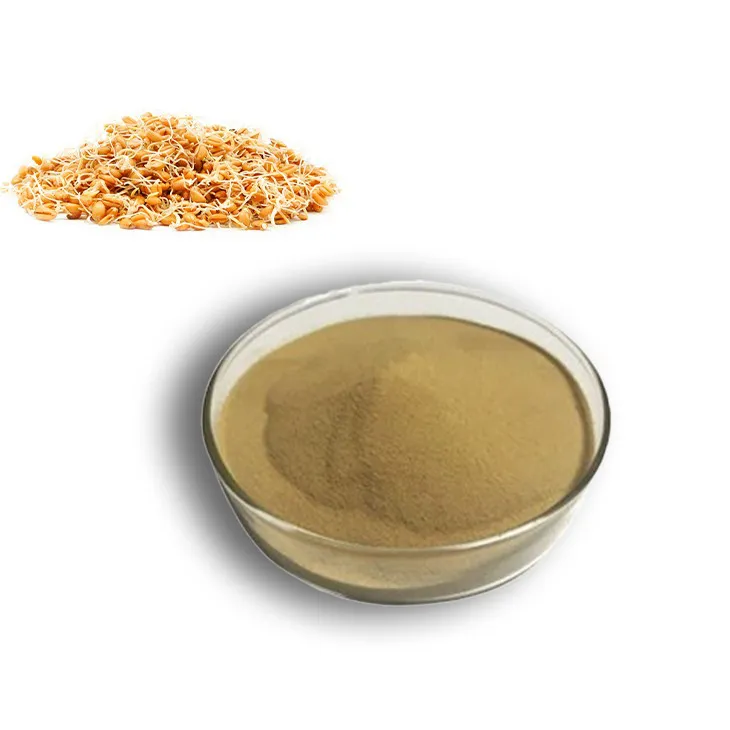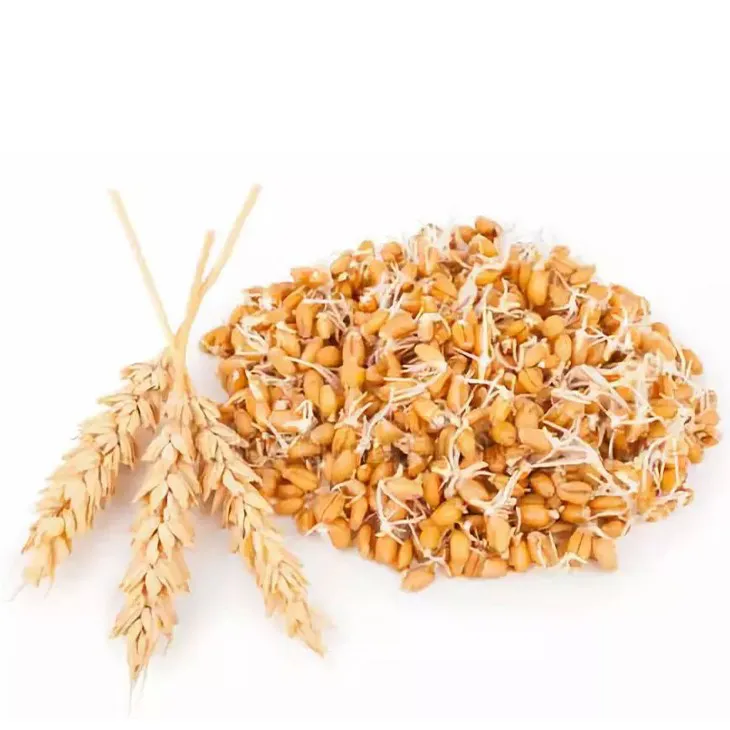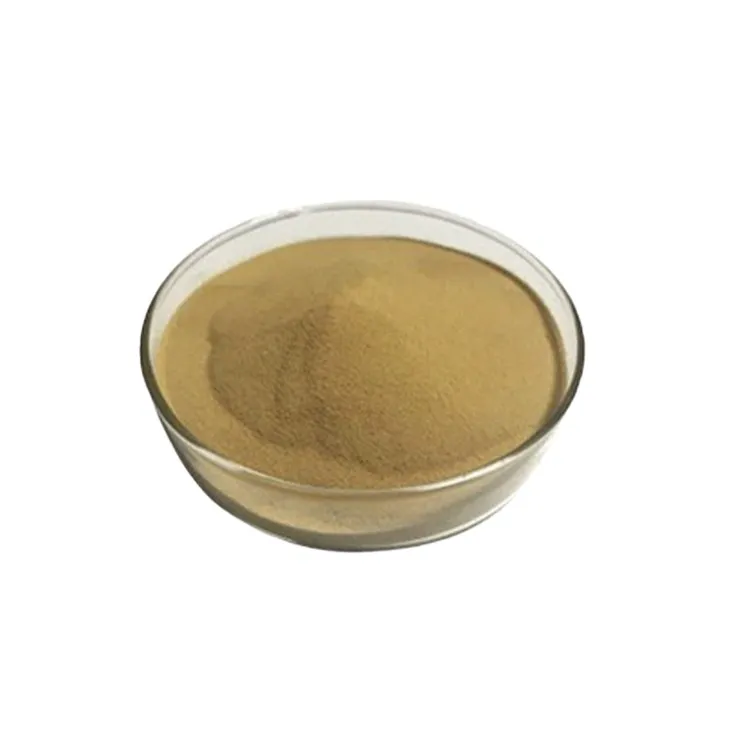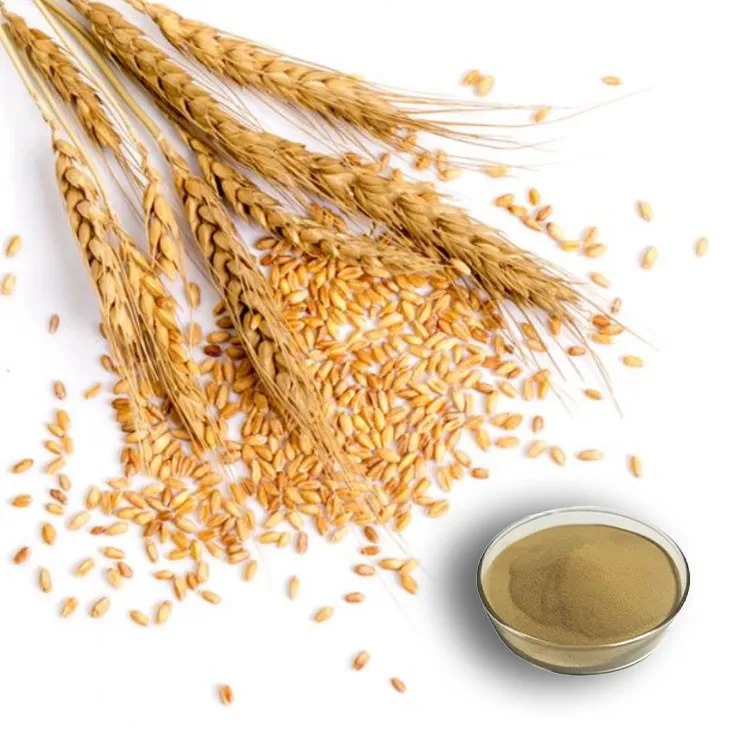- 0086-571-85302990
- sales@greenskybio.com
The Magic of Wheat Germ Extract Powder: A Comprehensive Guide
2024-11-13

1. Introduction
Wheat Germ Extract powder has been gaining increasing attention in recent years due to its remarkable properties. Derived from the germ of the wheat kernel, which is the embryo of the wheat plant, it contains a concentrated amount of nutrients that are beneficial for various aspects of health and has diverse applications in different industries.

2. Nutritional Composition
2.1 Vitamins
Wheat Germ Extract powder is rich in a variety of vitamins. It is a significant source of vitamin E, which is a powerful antioxidant. Vitamin E helps protect cells from damage caused by free radicals, which are unstable molecules that can cause oxidative stress in the body. Additionally, it contains B - vitamins such as thiamine (B1), riboflavin (B2), and niacin (B3). These B - vitamins play crucial roles in energy metabolism, nerve function, and maintaining healthy skin, eyes, and liver.
2.2 Minerals
When it comes to minerals, Wheat Germ Extract powder is not lacking. It contains potassium, which is essential for maintaining proper heart function and fluid balance in the body. Magnesium, another important mineral present in it, is involved in over 300 enzymatic reactions in the body, including those related to muscle and nerve function, as well as energy production. Iron is also found in wheat germ extract powder, and it is vital for transporting oxygen in the blood.
2.3 Antioxidants
As mentioned earlier, the presence of antioxidants in wheat germ extract powder is one of its major highlights. Besides vitamin E, it contains other antioxidants such as glutathione and phenolic compounds. These antioxidants work together to scavenge free radicals, reduce inflammation in the body, and may potentially lower the risk of chronic diseases such as heart disease, cancer, and neurodegenerative disorders.

3. Health - Enhancing Effects
3.1 Cardiovascular Health
The nutrients in wheat germ extract powder can have a positive impact on cardiovascular health. The antioxidants help prevent the oxidation of LDL (low - density lipoprotein) cholesterol, which is a key step in the development of atherosclerosis (hardening of the arteries). The magnesium content may also help regulate blood pressure, reducing the risk of hypertension. Potassium helps maintain a proper heart rhythm and overall heart function.
3.2 Immune System Support
The various vitamins, minerals, and antioxidants in wheat germ extract powder can boost the immune system. Vitamin C, for example, is well - known for its immune - enhancing properties, and while wheat germ extract powder may not be as rich in vitamin C as some other sources, the combination of nutrients works synergistically. The antioxidants help protect immune cells from damage, allowing them to function optimally, while the minerals play roles in cell signaling and immune response activation.
3.3 Anti - Inflammatory Effects
The antioxidants in wheat germ extract powder contribute to its anti - inflammatory effects. Chronic inflammation is associated with many diseases, including arthritis, diabetes, and certain cancers. By reducing inflammation, wheat germ extract powder may help alleviate symptoms and potentially slow down the progression of these diseases. For instance, phenolic compounds in the powder can inhibit the production of inflammatory cytokines in the body.
3.4 Skin Health
For skin health, the benefits of wheat germ extract powder are also notable. Vitamin E helps maintain skin elasticity and moisture, protecting it from premature aging caused by environmental factors such as UV radiation. The antioxidants in the powder can also help reduce skin inflammation, which is beneficial for those with skin conditions like acne or eczema. Additionally, the nutrients in the powder can support the overall health of skin cells, promoting a healthy complexion.

4. Applications in Different Industries
4.1 Food Industry
- In the food industry, wheat germ extract powder is used as a nutritional supplement in various products. It can be added to breakfast cereals, providing an extra boost of nutrients to start the day.
- It is also used in baking. When added to bread, for example, it not only enriches the nutritional value but also can enhance the flavor and texture of the bread.
- Some health - conscious food manufacturers incorporate wheat germ extract powder into energy bars and smoothies, targeting consumers who are looking for convenient and healthy food options.
4.2 Cosmetic Industry
- The cosmetic industry has also recognized the value of wheat germ extract powder. It is used in skin care products such as creams, lotions, and serums. Due to its antioxidant and skin - nourishing properties, it can help improve skin texture, reduce wrinkles, and enhance skin radiance.
- It is also used in hair care products. Wheat germ extract powder can strengthen hair follicles, reduce hair breakage, and add shine to the hair. This makes it a popular ingredient in shampoos and conditioners for those with damaged or dull hair.
4.3 Pharmaceutical Industry
- In the pharmaceutical industry, research is being conducted on the potential use of wheat germ extract powder in the development of drugs or nutraceuticals. For example, its anti - inflammatory and antioxidant properties may be harnessed to develop new treatments for chronic inflammatory diseases or to enhance the effectiveness of existing medications.
- It may also be used as a natural source of nutrients in dietary supplements formulated for specific health conditions, such as those related to heart health or immune system support.

5. How to Incorporate Wheat Germ Extract Powder into Your Diet
- One of the simplest ways to incorporate wheat germ extract powder into your diet is by adding it to your morning smoothie. Blend it with fruits, vegetables, and a liquid base such as milk or yogurt for a nutritious start to the day.
- If you prefer baked goods, you can add a small amount of wheat germ extract powder to your muffin or pancake batter. Start with a teaspoon or two and gradually increase the amount according to your taste.
- Another option is to sprinkle it on top of your oatmeal or cereal. This not only adds extra nutrients but also gives a slightly nutty flavor to your breakfast.
- For a savory option, you can mix wheat germ extract powder into homemade salad dressings or dips. It can add a unique flavor profile while also boosting the nutritional content.
6. Precautions and Considerations
While wheat germ extract powder offers many benefits, there are some precautions to keep in mind.
- Some people may be allergic to wheat, and in such cases, wheat germ extract powder should be avoided. Allergic reactions can range from mild symptoms such as itching and hives to more severe reactions like difficulty breathing.
- As with any supplement, it is important to follow the recommended dosage. Excessive intake of wheat germ extract powder may lead to potential side effects, such as digestive discomfort or an imbalance in nutrient levels.
- If you are taking medications, it is advisable to consult a healthcare provider before starting to use wheat germ extract powder. There may be potential interactions between the powder and certain medications, especially those related to blood clotting or blood pressure regulation.
7. Conclusion
Wheat germ extract powder is truly a remarkable substance with a wide range of benefits. Its rich nutritional composition, including vitamins, minerals, and antioxidants, gives it the potential to enhance health in various ways, from supporting the cardiovascular system to improving skin health. Its applications in different industries, such as food, cosmetic, and pharmaceutical, further demonstrate its versatility. However, it is important to use it with caution, taking into account potential allergies, proper dosage, and possible interactions with medications. By understanding the magic within wheat germ extract powder, we can make informed decisions about incorporating it into our lives for better health and well - being.
FAQ:
What are the main nutrients in wheat germ extract powder?
Wheat germ extract powder is rich in several key nutrients. It contains a variety of vitamins such as vitamin E, which is a powerful antioxidant. It also has B - vitamins like thiamin, riboflavin, and niacin. In terms of minerals, it is a good source of zinc, magnesium, and selenium. Additionally, it contains essential fatty acids and dietary fiber.
How does wheat germ extract powder enhance health?
The antioxidants in wheat germ extract powder, like vitamin E, help protect the body's cells from oxidative stress. This can reduce the risk of chronic diseases. The B - vitamins play a crucial role in energy metabolism, helping the body convert food into energy. The minerals are involved in various physiological functions, such as zinc for immune function and magnesium for muscle and nerve function. The dietary fiber aids in digestion and can help with maintaining a healthy weight.
What are the applications of wheat germ extract powder in the food industry?
In the food industry, wheat germ extract powder can be used as a nutritional supplement in various products. It can be added to breakfast cereals, baked goods like bread and muffins to increase their nutritional value. It can also be used in the production of health bars and smoothies, providing an extra boost of nutrients.
Is wheat germ extract powder suitable for everyone?
While wheat germ extract powder offers many health benefits, it may not be suitable for everyone. People with wheat allergies need to avoid it. Also, those with certain medical conditions or taking specific medications should consult their healthcare provider before using it, as it may interact with some drugs.
How is wheat germ extract powder produced?
The production of wheat germ extract powder typically involves several steps. First, the wheat germ is separated from the wheat kernel. Then, it is processed through extraction methods to obtain the beneficial components. This may include techniques like solvent extraction or mechanical pressing. After extraction, the resulting liquid is dried to form a powder, which can then be packaged for various uses.
Related literature
- The Nutritional Composition and Health Benefits of Wheat Germ Extract"
- "Wheat Germ Extract: A Versatile Ingredient in the Food and Nutraceutical Industries"
- "Antioxidant Properties of Wheat Germ Extract Powder and Their Implications for Health"
- ▶ Hesperidin
- ▶ Citrus Bioflavonoids
- ▶ Plant Extract
- ▶ lycopene
- ▶ Diosmin
- ▶ Grape seed extract
- ▶ Sea buckthorn Juice Powder
- ▶ Fruit Juice Powder
- ▶ Hops Extract
- ▶ Artichoke Extract
- ▶ Mushroom extract
- ▶ Astaxanthin
- ▶ Green Tea Extract
- ▶ Curcumin
- ▶ Horse Chestnut Extract
- ▶ Other Product
- ▶ Boswellia Serrata Extract
- ▶ Resveratrol
- ▶ Marigold Extract
- ▶ Grape Leaf Extract
- ▶ New Product
- ▶ Aminolevulinic acid
- ▶ Cranberry Extract
- ▶ Red Yeast Rice
- ▶ Red Wine Extract
-
Centella Asiatica Extract
2024-11-13
-
Lemon Extract
2024-11-13
-
Red Date Extract
2024-11-13
-
Jujube Extract
2024-11-13
-
Europen Bilberry Extract
2024-11-13
-
Eucommia Ulmoides Extract
2024-11-13
-
White mustard seed extract
2024-11-13
-
Curcuma Longa Extract
2024-11-13
-
Acerola Juice Powder
2024-11-13
-
Honeysuckle Pollen
2024-11-13





















